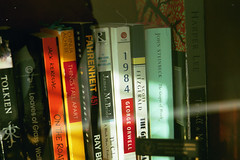A few nights ago I went out to her school during the evening to help her with some end of the year culling of the collection. My job was to stamp "Discard" on the covers, the title page, various interior pages, and on page 25. Apparently knowing about page 25 is kind of like a Masonic handshake. It's a secret code among librarians; they know that there are certain pages in a book whereby one stamps it into obscurity. It can be a perfectly wonderful book, even a Newberry Award winner. All it takes is one "Discard" stamp on page 25 and it is no longer in the catalogue that gives it life. Instead, it is cast off, despised, put on a book cart, and made available to anyone who will take it. If no one redeems it the book is then euthanized. I confess to being an accessory after the fact. I cannot bear the guilt. The ink is on my hands.
I cannot throw away books. My attic is a painful testament to that. We have in our house a room with two walls of floor to ceiling bookshelves. We have not read all those books. Not even close. But the thought of throwing them away is just too painful to imagine.
I once had a seminary professor who went blind. He could no longer read the books that had changed his life. He gave lectures on philosophical theology from memory, occasionally reading quotes from large type printouts with the help of a magnifying class. He got to the point of deciding to sell his library because he could no longer use it. I was involved in making the purchase on behalf of an institution for which I worked. He said that he had planned to price out the books individually. He would pick up a book and look at it, knowing that it was a "corner turner" in his own intellectual development. But he also knew it might mean nothing to anyone else. He told me, "It finally became too damn painful." So he slapped one price tag on the library that had shaped his life. The price he was paid was not even remotely commensurate with its value to this one man's intellectual soul.
Books aren't about paper and ink. They are the stuff of one's meaningful existence. To execute them is cruel and unusual punishment. Surely the Constitution protects them and all of us against that? I oppose the death penalty, but perhaps life in prison without books would be a fair punishment? I'm fond of library-media specialists, but someone has to take a stand.
Technorati tags: [books]






